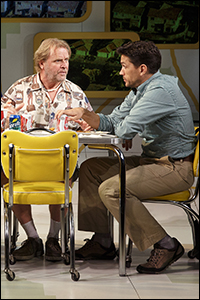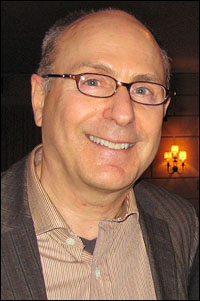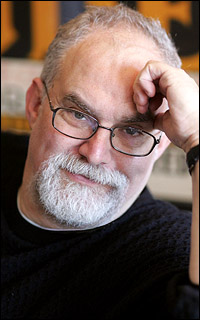
In Little Miss Sunshine — that dysfunctional-family/road-trip singalong coming off the Second Stage runway Nov. 14 — the profane old patriarch on board has been hitting some déjà vu bumps on the highway that jolt him back to his own happy childhood.
"What we did on family vacations," David Rasche recalled, "was ride in the car and sing songs in four parts. I sang tenor, my dad sang bass, my sister sang soprano, and my mom sang alto. We took long car vacations and sang in four parts all the time."
The songs back then were the everyday evergreens. The ones in the new musical are William Finn originals, based on a beloved indie Oscar contender for Best Picture of 2006. Michael Arndt, who quit his job as Matthew Broderick's assistant to write it, won the original screenplay Oscar, and Alan Arkin was likewise cited for Rasche's role of the crusty granddad, who teaches young Olive (Abigail Breslin) moves they hope will get her named Little Miss Sunshine in a California pre-teen beauty contest.
The rickety minibus that carries the Albuquerque clan to the contest 800 miles away in this musical Little Miss Sunshine could accommodate some six-part harmony, if angst-ridden teen Logan Rowland hadn't assumed a vow of silence. Other happy campers: An out-of-work motivational speaker (Will Swenson), his overburdened wife (Stephanie J. Block) and a suicidal gay uncle (Rory O'Malley). Hey, it's called family!
"My character has reached the point where he's ceased to care what people think of him, which is kind of a place we all get to," explained Rasche. "His speech is pretty much unedited. He just doesn't have an internal editor that says, 'Perhaps this would be inappropriate to say,' so he says what's on his mind all the time. He loves his family, but he says what he wants, and he is free from worrying what people think." Except for Granddaughter Olive. He's along for the ride as her coach, having created for her young body the bawdy movements that he studied in strip-joints.
Rasche is allotted two solos in the show: "You Are the Most Beautiful Girl in the World, Olive" (a verbatim line from the screenplay) and a cranky rant called "I'm the Only Adult Here Giving Good Advice." ("If you understand that I say anything I want to, my advice is pretty unfiltered.") Plus, he joins in several other numbers.
"Hannah Rose Nordberg, who's playing Olive, is delightful — experienced beyond her years," Rasche beamed. "She picks up the music like that. And, for me, it's wonderful to be back singing with people again, because it was my whole life until I was about 23 or 24. That's all I did. I went to choir practice every day. I sang in church. Singing was just a part of my family, a part of everything.
| |
 |
|
| Rasche and Will Swenson in Little Miss Sunshine. | ||
| Photo by Joan Marcus |
Then Chicago's Second City crooked its finger for him to come in to replace John Belushi, and the singing stopped. (But not the songwriting: One of his bitter ballads, "It Was Your Fault," become a Second City standard.) Acting and comedy came first.
Equipped in both departments, Rasche moved to New York City in 1977 and co-starred with Irene Dailey in an early Playwrights Horizons play by Martin Sherman called Rio Grande. "The floor was still sticky from when it was a strip joint."
The next year he made his Broadway debut in The Shadow Box as Mandy Patinkin's understudy "and played most of the run when Mandy retired from the role." Michael Cristofer's Tony and Pulitzer Prize-winning drama about three terminally ill patients and their loved ones "was a beautiful play. There were nights when your heart went out at the whole sorrow of someone dying and that theatre just levitated. The audience was so empathetic to these poor people who were in this play."
It was at Playwrights Horizons in 1982 that Rasche stepped out from the herd when director Gerald Gutierrez cast him against his sandy-headed beach-boy type as a sadomasochistic art director in Geniuses, Jonathan Reynolds' dark comedy about a rain-soaked, behind-budget war epic in the Philippine jungle. "That was a huge hit, and nobody had any idea it would be," he remembered. "Our movie was identified as 'Parabola of Death.' What happened was, Jonathan went to do a book about the making of 'Apocalypse Now,' and there was this huge typhoon that wrecked the sets and shut them down. Then he went home, and Coppola's wife came and took over. I don't know whether any of that was true or if it's just a Jonathan Reynolds fantasy." A lingering Chicago connection, David Mamet, made sure Rasche got good shots at his work in New York (Sexual Perversity in Chicago, Speed-the-Plow and Edmond).
He tippy-toed into features, uncredited, in 1978's "An Unmarried Woman" and as Television Actor #3 in"Manhattan" but was soon co-starring in Bette Davis' last, "Wicked Stepmother," and Clint Eastwood's "Flags of Our Fathers" — all the while building a household face in TV series, starting with his starring-role of "Sledge Hammer!" (spoofing Eastwood's "Dirty Harry") and continuing episodically via "Bored to Death," "L.A. Law," "The West Wing," "Veep," "Monk," "Suddenly Susan" and "Ugly Betty."
Like Lorna Dallas, Cheyenne Jackson, David Alan Basche, Denny Dillon, Chip Zien, John Rothman, Richard Bekins, Olivia Thiriby, Kate Jennings Grant and Peter Hermann (all New York names), he was one of the familiar-but-not-star-familiar faces aboard "United 93," the 2006 reenactment of the skyjacked plane that crashed 9/11 near Shanksville, PA, mission unaccomplished. Paul Greengrass, who directed "Captain Phillips" and got Tom Hanks' personal best in the last ten minutes of his performance, helmed.
| |
 |
|
| James Lapine |
"Nobody knows what anybody did, but what Paul guesses is that my guy was an amateur pilot and there was talk about what do we do. It could have conceivably been that they'd have said, 'We'll go in. We'll get the guys. You fly the plane.' I don't know if that's what happened, but that's what he speculated, and that's what we did.
"Paul's absolutely brilliant, the most fearless director I've ever worked with. He had an idea and a structure, but he didn't have a script because no one knows what happened from 9:30 when the terrorists took over to 10 when the plane went down, but he knew he had the faith that if he had a bunch of actors and some ideas that we would improvise our way through it. I can't tell you how much research he did on this thing. He met every single family, had dinner with them and interviewed them.
"It was very tiring to do. We must have done those 30 minutes at least 40 times, day after day after day, with cameras in a different spot. The terrorist would come in, and we'd react and do the whole half-hour. Then we'd take a break and do it again.
"I think there was another guy who was supposed to play the chief of the control tower, but it didn't really work out well. He then called the real guy, and that guy came in and did it. What he did was what he did and what he said was what he said." So what, at this late date (he's 69 and a bona fide grandfather) got Rasche back on musical track? Four words: Casting director Bernie Telsey. "I auditioned for another musical, which will remain unnamed, and was not cast, but Bernie thought, 'This guy can do it' when this thing came up, and he contacted James Lapine and William Finn.
"I've know Bill Finn for a long time, from around. The first time I knew of Bill — and I think James Lapine directed it — was a production of A Winter's Tale at The Public with Mandy years ago. Finn wrote the music, and I'll never forget that music. When I told him that, he said, 'You're the only person who has ever commented on it!'
"It's an exciting time to be working with Lapine, because he's the guy who said, 'Let's make this into a musical.' He's the guy who brought Bill Finn in." It figured: They did The 25th Annual Putnam County Spelling Bee and March of the Falsettos together.
| |
 |
|
| William Finn |
Now that Rasche's "music box" has been opened on a professional theatre stage, is he shopping around suddenly for more reasons to lift his voice in song? "I'm thinking this is so much fun right now I'm not thinking ahead. I don't think anyone is. This is very adventuresome on Lapine's part and also on Bill Finn's part to take something like this. This'll be different from their La Jolla version. It had a reincarnation there, and they completely reworked it. We're nothing like that. It's much more intimate. They had a chorus and cast of 14, and they're not doing that this time. They're really going to concentrate on the family. What they're trying to do is expand the characters a little bit — find out a little bit more about them — so that the songs are arias. They're talking about themselves in a way they didn't do in the movie."
Rasche continues to trip the light fantastic — his vainglorious actor in To Be Or Not To Be, though not a conscious imitation of Jack Benny, nevertheless beckoned Benny — and scores of other stylish comedic turns. But he's still drawn to the dark-meaty roles and devours them on the spot, often making a memorable spectacle.
Second Stage handed him one of his best last year in Kenneth Lin's Warrior Class. "I was a political operative, who found a young Chinese politician and was shepherding him through politics — trying to get him in the right spot, trying to get him on the right committees. As it turns out, I had my own reasons for doing what I was doing. I put my own personal tragedy in it. That was also a wonderful play because you found out about everybody. I came off as a really selfish, mean guy — till you realized what tragedy I had. Then you thought, 'Gee, things are pretty mixed up.'
"Again, it was a wonderful cast, and Evan Cabnet directed it. Directing is a high-wire act. You juggle to let the audience discover but you have to have things in order. Lapine said the same thing: To be told to move there or do that isn't fun for anyone. "Well, I did enjoy Warrior Class, but I'm like any other actor. When you get a role, you marry it, and, at that moment, it's your favorite role that you've ever played. You're married. It's the best role — the best musical I've ever had. You fall in love."










